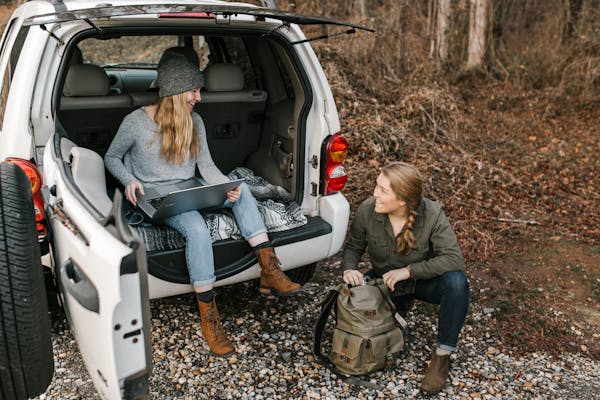Guest post by Shaimaa Mortada
Are you thinking of becoming an RVer? Your first step is to determine what type of RV suits you best. Today, you can find it difficult picking out the RV to make your dream of RV-lifestyle come true. There are hundreds of different makes, styles, models, and floor plans with even more options.
You can easily become overwhelmed with all of the many options and classes of RVs available. The trick to getting a good one that suits you the best is doing your research, understanding your budget and having a good idea of where you plan to travel with your RV.
In this article, we will help you understand the different types of RVs and differences between them. Depending on the RV that you choose, depends on the types of RV supplies that you will need. Our hope is that by the time you finished reading this article, you can confidently purchase or rent the type of RV that will make your RV-lifestyle dream come true.
RV Types
RVs are divided into 3 basic categories which include:
§ Motorhomes (Including Bus Conversions)
§ Travel Trailers (Towable RVs)
§ Truck Campers
Motorhomes
Motorhomes make a perfect combination of your vehicle and living quarters. It brings a lot of power and convenience. The engine is built-in, which means you don't have to deal with hassles of hooking and unhooking the RV from the vehicle. This type of RVs is without a doubt the best since it gives you a great option for multi-stop road trips.
There are 3 types of Motorhomes:
1. Class A Motorhomes (Size: 22-40 feet)
Class A motorhomes have a lot of spaces inside. If you love the convenience and want to travel in style, Class A motorhome is probably your best option. The large space inside allows it to have features such as living room, bedrooms, kitchens and full bathrooms, including all the amenities from home. New models of Class A motorhomes by some brand feature slide-outs to extend the square footage when parked.
Class A motorhome is the way to go when you are looking for space and luxury:
Pros
§ A lot of space
§ A lot of amenities
§ Large interior living spaces
Cons
§ Very expensive to buy, rent or even repair
§ Intimidating to drive
2. Class B Motorhomes (Size: 15-22 feet)
Class B motorhomes are known for their convenience and efficiency although they are the smallest type of motorhomes. This type of motorhome is an ideal choice for small families who desire modern living amenities and ease of van travel. Class B motorhomes are also called "Van Campers". You can walk upright inside this RV.
Pro
§ Easy to drive
§ Less expensive and fuel than Class A
§ Simple campsite setup
§ Convenient for day trip excursions
Cons
§ Tiny storage and cargo areas
§ Limited amenities
§ Ideal for one or two persons
3. Class C Motorhomes (Size: 22-35 feet)
Class C motorhomes are built for families or a larger group that needs a vacation on a more limited budget. This type of RV is a good mid-size option. Some of them feature side slide-outs. Depending on the make and the model, the amenities inside can range from basic to luxurious. They are a great choice for family vacation due to their ability to tow a small vehicle.
Pros
§ Ideal for a family vacation
§ Less expensive than Class A motorhomes
§ Self-contained with all basic amenities
§ Additional sleeping area or storage area above the driver's cab.
Cons
§ Driving it can be challenging
§ Expensive to maintain and operate
§ Lack of some luxury amenities
Towable RVs
Another category of RVs is the towable RVs; this type of RV can be easily detached from the vehicle making them ideal and convenient for RVers who stay in one location for a few days.
Another advantage of this category of RV is that they are more fuel-efficient than motorized models. Additionally, most families choose towable RVs because of their cost-effectiveness. You can easily purchase or rent them in different sizes and styles. They also contain a different range of amenities from the basic to the luxurious.
Note that the weight of the RV and the size of your vehicle's engine are the two most important factors that will determine the vehicle that you can use to tow your RV.
4 types of RVs under this category:
1. Travel Trailer (Size: 12-35 feet)
The travel trailer has a wide range of sizes making them the most standard type of towable RV. You can easily find the model that is right for the size of your family and your budget. You can attach them to your truck with a simple hitch and unhook them easily when you want to drive the vehicle independently.
2. Truck Camper (Size: 10-20 feet)
Truck camper has the same design as Class C motorhomes. They are installed on top of a pickup truck and designed to extend over the truck bed. These types of RVs are mostly compact. However, some of them feature slide-out for extra space.
3. Fifth-Wheel Trailer (Size: 20-40 feet)
These types of RVs got their name from the fifth-wheel hitch used to attach them to a pickup truck. It looks like a truck camper because it extends over the truck bed. However, unlike truck camper, it has more space and amenities.
4. Sport Utility RV (Toy Hauler) (Size: 20-40 feet)
These types of RVs was designed with the sports enthusiast in mind, it features a big storage area for dirt bikes, motorcycles, and ATVs. It also comes with a fold-down ramp which makes it very easy to loading and unloading. You will see a separate living room and sleeping quarters in the most models of this RV.
Conclusion
Now you have known different types of RVs and their functions, I hope you can easily choose the one that best suits you. You don't have to buy an RV if you cannot afford one.
In fact, most people prefer to rent it for a short period of time. Whether you choose to buy one or rent it, ensure that the RV parts are working great so that you and your family can be safe and have an awesome RV-lifestyle experience.
This was a guest post by Shaimaa Mortada. To write a guest post, review our guidelines.




